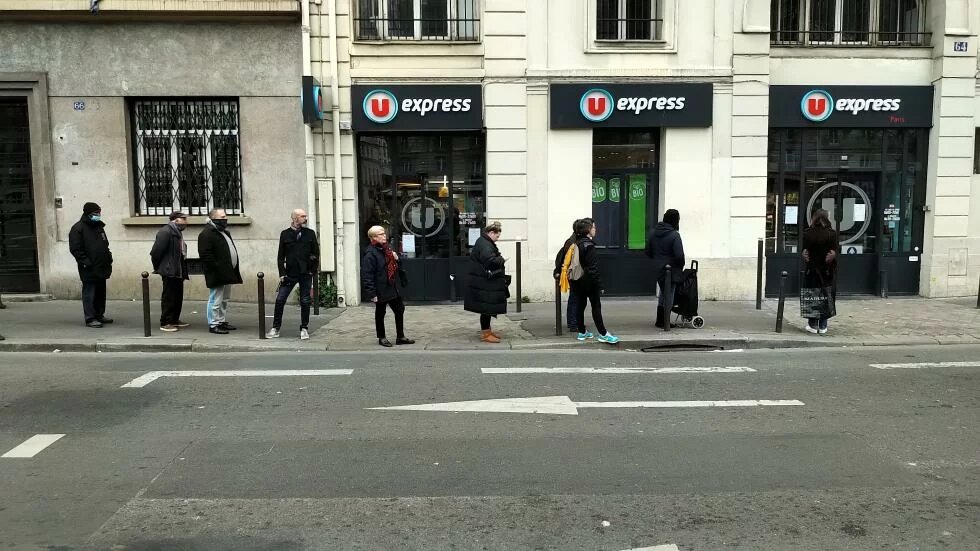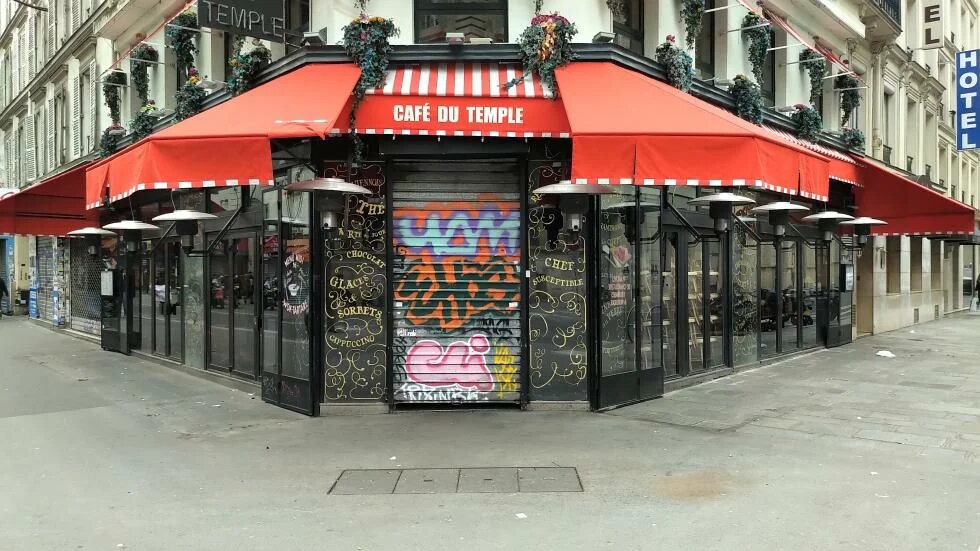

On every corner, spring begins to blossom, with sunlight bathing the boulevards in its gentle warmth. The burgeoning spring is an enticing time of year. Normally, it would wake Paris from its hibernation: the pavement terraces outside cafes and bars would be crowded, lively and loud, people sitting, chatting, laughing in the sun over a café au lait or an aperitif, before heading out in the evening to one of the city’s many and mostly excellent restaurants, serving everything from rustic fare to fine dining, traditional dishes à la française and exotic cuisine from all corners of the globe. Now, this usually bustling city is as empty as a ghost town. Bars, cafes, restaurants and everything else have been closed down, with towers of empty chairs piled up behind the windows. The sole long queues are to be seen outside supermarkets, bakeries, butchers and pharmacies, everybody keeping at least a metre away from each other.
France is strictly under lockdown and has been since midday on Tuesday, 17 March. People are only allowed out of their homes if they fill in and sign a form and take it wherever they go. There are only five exceptions to the curfew: for those who urgently need to go to work, because it is essential in the current situation and because they cannot choose to stay in home office, those who need to do shopping, or go to the doctor’s or to the hospital, for those who urgently need to care for family members, or want to do a bit of exercise or need to take the dog out. The exception for outdoor exercises was very soon restricted, as hordes of people continued to go on pilgrimage to the beaches of the Mediterranean or to drive to nearby forests and recreation areas. Now most beaches have been closed, along with many forests and public rights of way. Joggers must stay within a radius of 1 km and can go out for maximum 1 hour - and cycling is temporarily banned. The measures could go even further: In Italy, there is now a ban on all sporting activities outside home. There are more than 100.000 police and security forces on the streets to enforce the curfew. In about the first week, over 800.000 controls have been carried out across the country and over 40.000 people have been handed down fines of at least €135.
In Germany in most of the regions and cities, people are still allowed to go out – but obviously not to have meetings with more than two people - and the death rates are still low, fortunately, whereas France, is about to plunge into a situation like in Italy or Spain. The steep upward curves of people infected by coronavirus, patients seriously ill relying in artificial respiration and those who have already died are almost identical, with a delay in time: 22.300 people are known to be infected. The actual figure could be far higher, as tests are only carried out in acute cases. 10.176 people are already in hospital, 2.082 of them are under artificial respiration at huge costs and half are under the age of 60. 1.100 people have already fallen victim to the virus. These figures are climbing faster every day. There is a countrywide shortage of masks, particularly for professionals who work in hospitals and care homes. The situation is quite dramatic, especially in the Grand Est region, which encompasses Alsace, Lorraine and Champagne. Especially in Alsace, the hospitals are completely overwhelmed, the army is currently building a field hospital and flying severe cases to other hospitals elsewhere in the country, for instance to Toulon in the South or Bordeaux in the West. In Mulhouse, a religious gathering brought evangelicals together in February 2020 for a week of communal prayer and fasting, very quickly spreading the virus throughout the region.
The much-vaunted Franco-German partnership – not to say friendship – went by the board terrifyingly quickly and unambiguously. There was no trace of the popular soap box speeches or treaties such as the Aachen Treaty, which was concluded in celebration and incidentally stipulates a mutual duty of assistance between the two countries in the event of armed conflict. Instead of hurrying to the assistance of Alsace or offering support in this calamitous situation, Germany unilaterally shut its borders. On television in France, there were images of citizens on the French side being stopped and sent back, whilst, vice versa, others were still freely able to enter France from the German border. Shattering symbolism in this situation. What would have been the effect if the pictures had instead been of trucks carrying medical goods and busloads of doctors coming over from Germany to help out their French colleagues in this emergency situation, and of ambulances taking the sick to hospitals on the other side of the Rhine that still had room for them, to take a bit of the burden off Alsace’s shoulders, at least for a short time? Of supermarkets welcoming French customers and expeditiously implementing the necessary hygiene measures, with limits on numbers of customers in the shop and keeping people in queues a minimum distance apart? Germany, where the epidemic is expected to peak later, would benefit in turn from the experiences of their French, and also Italian, colleagues in the fight against coronavirus, just as Italy is now welcoming Chinese and even Russian doctors into the country. It could have been a golden opportunity to highlight the value and significance of the Franco-German partnership. Could have been. At least at the last weekend, the state of Baden-Wuerttemberg, governed by the Greens, offered treatment to some critically ill patients from Alsace in their hospitals, the states of Saarland and Rhineland-Palatinate followed, and the state of Saxony proposed some days later to accept patients from Italy in their hospitals. Even if this started with some low numbers of proposed places in German hospitals – as well as then also in hospitals of Luxembourg and Switzerland - these are important signs of European solidarity. Hopefully, there will - and there should be - much more in the coming days and weeks.
Paris, days later on Friday, 13 March – and a hundred years ago. The evening before, President Macron had solemnly addressed the nation. He announced the closure of all kindergartens, schools and universities, promised support to the economy and reminded French citizens to wash their hands and keep their distance from one another. This, in itself, is no mean feat in a country in which everybody greets each other with a minimum of two kisses on the cheek, depending on the region, and where a formal handshake was enough to immediately identify you as a German. But even those are no longer permitted. The President swiftly shelved the pension reform that had torn the country apart for months and crippled it with strike action. Completely unexpectedly, however, Macron announced that the country’s communal elections would still go ahead. Consequently, life initially continued as usual, with happy and carefree Parisians sitting elbow to elbow in the cafes and bars of the city on Friday evening and swarming between the market stalls on the boulevards: it can’t be that bad, if we’re still being told to go and vote. But that was a step too far for Prime Minister Philipp. On Saturday 14th May, he ordered all cafes, bars, restaurants and all shops, other than food shops and pharmacies, to close with effect from midnight. The elections still went ahead on Sunday 15th, albeit with people keeping a safe distance from each other and hand sanitiser in every polling station. However, 54.5% of the electorate chose not to turn out, 18% more than last time – a record high. Despite the unprecedented circumstances, the dynamic of the weeks before still clearly made itself felt and the French Greens were among the major winners in these elections: in cities such as Strasbourg, Lyon, Rouen, Bordeaux, Besançon, Rennes, Lille and Metz, they came in first or second place – an excellent starting position for the second round of voting required in all these communes. In more than 30.000 out of around 35.000 communes, mostly smaller towns and villages, one specific list won more than 50% of the vote in the first round, thereby securing a municipal council and a mayor. Just over 5.000 communes will have to vote again and were scheduled to do so on 22 March.
Yet the situation changed dramatically after the apparent normality of this election Sunday: in a second address to the nation just four days after the first, President Emanuel Macron spoke on Monday evening, 16 March of a “war” against an unseen enemy, cancelled the second round of the communal elections – and announced a general lockdown for the next two weeks, with effect from the following Tuesday at noon. The very short notice of this curfew led to people crowding into trains and Metro carriages to get to wherever they preferred to sit out what was expected to be a considerably longer period of house arrest. French citizens able to work from home and in possession of a country house or holiday home took shelter here. Despite the mixed messages sent out to begin with, opinion polls suggest that around 54% of people are now satisfied with the government’s crisis management – an amazing amount given the unpopularity of Emmanuel Macron and his ministers in the preceding weeks.
France has now passed a couple weekends during which its citizens were forced to remain at home. There are already many reports of what this curfew means to people who are alone and live alone, particularly if they are older and generally not in the best of health. Domestic violence, particularly against women, is on the rise. In the media, psychologists are making suggestions to help couples and families survive being cooped up together 24 hours a day. Reports suggest that divorce rates have gone through the roof in regions of China that spent several weeks in strict lockdown. Fitness trainers are giving tips for a daily exercise regime within your own four walls. It is particularly tough on those who are now fearful for their professional futures due to the closure of the cafes, restaurants and shops, and the self-employed, who are also wondering what they are going to live on over the next few months.
Very quickly, often inspired by the Italian example, many initiatives have been set up, many of them via social media: there are neighbourhood assistance groups offering to go shopping for people who cannot. Students are giving lessons to schoolchildren who are now stuck at home. Couples are arranging to meet for a drink over Skype – and every evening at 8 pm, the whole country stands at their windows or on their balconies and applauds all those working in the hospitals giving their utmost to help the fast increasing number of the seriously ill under conditions that are growing more extreme every day.
The article was first published in German on fr.boell.org.